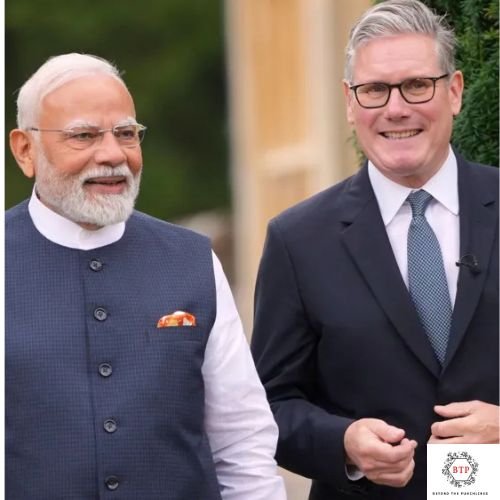
Despite strengthening trade ties, Britain’s new leadership under Keir Starmer signals no immediate relaxation of UK visa rules for Indians regulations for Indian nationals.
London’s Firm Stance on Immigration
In a move that has stirred debates among businesses and policymakers, UK Prime Minister Keir Starmer announced that his government has no plans to relax visa rules for Indians, even as the United Kingdom and India finalise their long-awaited Free Trade Agreement (FTA).
Speaking ahead of his visit to Mumbai on October 8, 2025, Starmer clarified that visa liberalisation is “not part of the plan”, reiterating that the focus remains on trade and investment rather than migration. This decision underscores the government’s strategy to separate immigration policy from economic agreements.
What Starmer Said
Addressing reporters before departing for India, Starmer stated, “We are committed to a trade partnership that creates jobs and investment opportunities. UK visa rules for Indians regulations are not included in this agreement.”
He further emphasized that while Britain values its partnership with India, any changes in immigration policies will not be linked to the trade deal. The statement comes at a time when the UK faces domestic pressure to tighten immigration laws amid concerns over rising migrant numbers.
Context: UK-India Relations and Trade Talks
The UK visa rules for Indians have been negotiating the FTA for several years, aiming to boost bilateral trade across sectors such as technology, healthcare, green energy, and finance.
Many observers had hoped that the agreement would pave the way for easier visa access for skilled Indian professionals and students, particularly in sectors with labour shortages.
However, Starmer’s firm stance makes it clear that visa policy will remain restrictive, maintaining the points-based system currently in place.
UK visa rules for Indians: Domestic Pressures in the UK
Immigration has become a politically sensitive topic in Britain, with opposition parties and sections of the public demanding tighter border controls. By ruling out relaxed visa norms for Indians, Starmer’s administration aims to reassure domestic voters of its commitment to controlled migration policies while advancing trade relations with India.
UK visa rules for Indians: Business Community Reacts
UK industries, especially in IT, healthcare, and higher education, expressed disappointment over the announcement. Many business leaders argue that Britain’s ageing workforce and skill gaps require a steady inflow of qualified foreign workers—something Indian professionals have historically provided.
A leading figure in the UK Chamber of Commerce commented, “Trade agreements without labour mobility provisions fall short of addressing our long-term workforce challenges. We hope the government revisits this decision in the future.”
India’s Perspective
While the Indian government refrained from issuing a formal response, industry experts in India have expressed concern that Starmer’s decision may limit the growth of tech and service-sector collaborations. Indian students seeking higher education in the UK could also face stricter rules on post-study work opportunities.
Implications for the Free Trade Agreement
Despite the visa deadlock, the UK visa rules for Indians FTA are expected to move forward, focusing on tariff reductions, investments in green technology, and digital economy partnerships. Analysts believe that both countries stand to benefit from enhanced trade but acknowledge that the exclusion of visa reforms may slow down the full potential of people-to-people exchanges.
UK visa rules for Indians: The Road Ahead
Starmer’s comments suggest that the UK visa rules for Indians will continue to prioritise economic collaboration over migration policy changes, signalling a cautious approach to balancing domestic political pressures with global trade ambitions.
For now, Indian professionals and students aspiring to move to the UK will have to navigate the existing points-based immigration system, with no additional concessions expected in the near future.
FOR MORE BLOGS – beyondthepunchlines.com

 Add to favorites
Add to favorites








